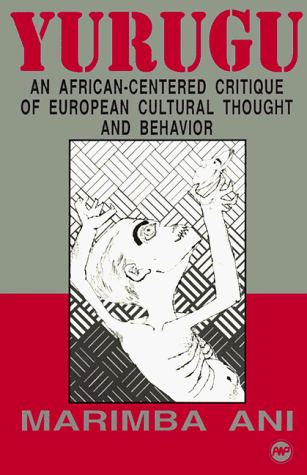Artist Philosophy
My artistry is given structure and direction from the literature I have read. Most of my reading has been focused on defining the nuances of the African Diaspora through both fictional narratives and historical accounts. Below are some books that are foundational to my artistic approach and brief explanations on how each work has influenced my craft.

01
Yurugu: An African-Centered Critique Of European Cultural Thought And Behavior
Within the book, Dr. Marimba Ani analyzes the characteristics of European thought while comparing it to traditional African worldviews in order to elucidate why Western society operates the way that it does. One keen observation she makes is that European's viewed time as a single, linear, immutable thread that occurred in 3 distinct phases; 'Past', 'Present' and 'Future'. Conversely, many African societies saw the 'Past' and 'Present' as events that occurred at the same time and they often disregarded the 'Future', so much so that many cultures did not even have a word for it. I often utilize this alternate perception of time when working on Afrofuturistic projects and attempting to distinguish the world of the story from our own.
02
The Mis-Education Of The Negro
Carter G. Woodson's seminal work challenges the perception around using traditional education as a tool of liberation. He argues that, for people of African descent, higher education institutions cannot equip individuals with the knowledge necessary to uplift their communities. Therefore, alternate modes of education centered on Black history and culture are imperative to produce capable African adults. Lastly, Woodson stresses that the purest form of leadership is service to one's community. Anyone who fashions themselves as an effective leader must also learn how to be an effective follower. This book constantly fuels my passion to learn more about the African diaspora and to infuse that knowledge into my craft in an attempt to provide an alternate mode of education to developing Black youth around the world.

03
Gem Of The Ocean
In my opinion, there is no other piece of art that makes the cultural connection between African Americans and pre-colonial Africans as effectively as Gem Of The Ocean by August Wilson. Taking place in Pittsburgh in 1904, this play dramatizes the emergence of The Great Migration, interrogates the relationship of Black individuals within law enforcement with the rest of the community and ponders the cost and weight of freedom among many other conversations. In every creative endeavor I pursue, I attempt to make my work as nuanced, as moving, as insightful and as spiritually satisfying as I believe this work to be. Gem Of The Ocean is the paragon of quality I reference consistently in my own creative processes.

